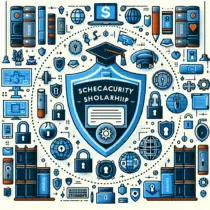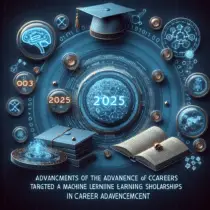In the rapidly evolving world of education, remote learning has become a dynamic and accessible way to pursue academic goals. Remote learning scholarships are pivotal in removing financial barriers and providing students with opportunities to attend prestigious institutions or programs from anywhere in the world. With technological advancements, education is no longer confined by geographical limitations, and scholarships are one powerful way to promote equity in access to education.
Expanding Horizons through Remote Learning
Remote learning offers flexibility and access to quality education that might otherwise be out of reach for many students. With the right resources and support, learners from diverse backgrounds can gain the skills and knowledge they need to succeed. Scholarships specifically designed for remote learning play a crucial role in this effort.
Take, for instance, the “Educational Fund International Awards in the USA 2023“. This scholarship opens doors for international students to enroll in U.S. institutions without leaving their home countries. By removing the financial burden of tuition fees, such scholarships help bridge the gap between students’ potential and their academic aspirations.
Benefits of Remote Learning Scholarships
The advantages of remote learning scholarships are multifaceted. Firstly, they provide financial assistance to students who might struggle to afford education otherwise. Secondly, they offer a way to maintain a flexible schedule, allowing students to work or care for family members while pursuing their studies. Finally, scholarships often come with additional support, such as mentorship programs or access to exclusive resources, further enhancing the learning experience.
The “CAD$10,000 Computer Science Innovators Grant in Quebec City, Canada, 2024” is another excellent example. This grant supports students in the field of computer science, enabling them to innovate and excel through remote learning platforms. By providing substantial financial backing, it encourages budding computer scientists to push the boundaries of technology and innovation without being hindered by financial constraints.
Key Remote Learning Scholarship Opportunities
Educational Fund International Awards in the USA 2023
The “Educational Fund International Awards in the USA 2023” is designed to attract and support international students who wish to pursue higher education in the United States through remote learning. The program focuses on providing access to top-tier academic programs while covering tuition and additional expenses. This initiative not only brings a diverse range of perspectives into U.S. classrooms but also ensures that talented individuals worldwide can access world-class education.
CAD$10,000 Computer Science Innovators Grant in Quebec City, Canada, 2024
In Quebec City, Canada, the “CAD$10,000 Computer Science Innovators Grant in 2024” is making waves in the realm of remote learning. Aimed at students specializing in computer science, this grant encourages innovation and advanced research in the field. By offering substantial financial support, it empowers students to explore new technologies and contribute to cutting-edge developments in the digital landscape.
Applying for Remote Learning Scholarships
While the prospect of securing a remote learning scholarship is exciting, the application process can sometimes be daunting. However, with the right planning and preparation, aspiring students can enhance their chances of success.
- Research Thoroughly: Begin by understanding the various available scholarships. Look for those that align with your field of study and career aspirations. Websites of educational institutions, scholarship databases, and even social media can be valuable resources.
- Meet Eligibility Requirements: Ensure you meet all the eligibility criteria for the scholarships you are interested in. These may include academic achievements, field of study, nationality, or financial need.
- Prepare Your Application Materials: Gather all necessary documents, such as transcripts, letters of recommendation, and a well-crafted personal statement. Highlight your achievements, goals, and how the scholarship will help you achieve them.
- Submit Your Application on Time: Pay close attention to deadlines and submit your application well in advance. Late submissions are often not considered.
The Impact of Remote Learning Scholarships
The transformative power of remote learning scholarships extends far beyond individual benefits. By providing access to quality education, these scholarships contribute to the broader goal of creating a knowledgeable and skilled global workforce. They promote cultural exchange, enhance international cooperation, and drive innovation across various fields.
The “Educational Fund International Awards in the USA 2023” exemplifies this impact by fostering a diverse learning environment where students from different backgrounds can collaborate and share unique perspectives. Similarly, the “CAD$10,000 Computer Science Innovators Grant in Quebec City, Canada, 2024” nurtures the next generation of tech leaders who are equipped to tackle global challenges through innovative solutions.
Future Prospects of Remote Learning and Scholarships
As technology continues to advance, the potential for remote learning scholarships will grow exponentially. Virtual reality classrooms, AI-driven personalized learning paths, and immersive simulation experiences are just some of the future developments that could redefine education.
Scholarship programs will need to adapt to these changes by offering support for emerging fields and technologies. Additionally, there will be a greater emphasis on inclusivity, ensuring that students from underrepresented communities can also benefit from these opportunities.
The Role of Organizations and Institutions
Educational institutions and organizations play a pivotal role in promoting and administering remote learning scholarships. They must actively work toward creating more funding opportunities and ensuring that these scholarships are accessible to a broad range of students.
Collaboration between universities, private companies, and non-profit organizations can lead to the creation of more comprehensive and impactful scholarship programs. By pooling resources and expertise, they can address the diverse needs of students and create a more inclusive educational landscape.
For instance, a tech company could partner with a university to offer a scholarship program similar to the “CAD$10,000 Computer Science Innovators Grant in Quebec City, Canada, 2024”. Such collaborations can foster innovation and provide students with access to industry expertise and resources, further enhancing their learning experience.
Conclusion
Remote learning scholarships are a vital tool for expanding educational opportunities and breaking down barriers to access. They empower students to pursue their academic and career goals, regardless of their financial circumstances or geographic location. Programs like the “Educational Fund International Awards in the USA 2023” and the “CAD$10,000 Computer Science Innovators Grant in Quebec City, Canada, 2024” are shining examples of how financial support can unlock the potential of talented individuals worldwide.
As technology and education continue to evolve, the role of remote learning scholarships will only become more significant. By investing in these programs and ensuring their accessibility, we can create a more inclusive, innovative, and dynamic global educational ecosystem. These scholarships do more than just fund education—they invest in the future of our global society.






